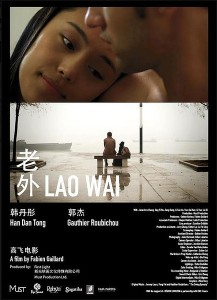Lao Wai
老外
China, 2010, colour, 16:9, 91 mins.
Director: Fabien Gaillard 高飞.
Rating: 7/10.
Slight but charming cross-cultural romance that avoids all the usual pitfalls and cliches.
Shanghai, the present day. Paul (Gauthier Roubichou), a French freelance IT engineer, meets Mei (Han Dantong), who teaches Chinese to foreign students, in a DVD store one day and he invites her to a club where he sings with an amateur band. The two start dating, and six months later she moves in with him. The night before he’s due to travel with her to Wuhan to meet her parents during Chinese New Year, Paul gets drunk at a party thrown by his ex-girlfriend, Australian Chinese Vicky (Zhang Yuanzhen), and ends up in her bedroom after passing out. When Mei finds out, she breaks with him and travels alone to Wuhan; but Paul follows the next day, hoping to patch things up.
REVIEW
Produced by Shanghai corporate video house Must Production, and directed by 33-year-old, China-based French writer-director Fabien Gaillard 高飞, Lao Wai 老外 is as remarkable for what it doesn’t do as for what it does. Avoiding every cliche that cross-cultural romances are heir to – and especially the oriental exoticism especially favoured by French film-makers – Gaillard’s filmic love-child from his five years in China has an utter naturalness and touching simplicity in which the central relationship is the thing, played with cute-free charm by both Han Dantong 韩丹彤, a Central Academy of Drama graduate in her first big-screen role after some TV drama, and Gauthier Roubichou, a Shanghai-based singer-guitarist with the group Swing Dynasty.
With its unforced portrayal of everyday life in China, easy rhythm that’s neither arty nor commercial, and avoidance of both “chopstick cliches” and the usual Mainland stereotypes, the movie sets a grown-up standard that other film-makers (both western and eastern) would do well to emulate. For Roubichou’s Chinese-speaking Paul, China is simply a place where he lives and works, not a convenient location for soul-searching or spiritual anomie; and for Han’s young teacher Mei, Paul is simply a sympathetic foreigner she falls for, not an exotic catch or cultural/social impediment.
It’s a measure of the leads’ chemistry and the film’s seemingly effortless simplicity that, with a predictable, almost zero plot, it manages to sustain even its tight, hour-and-a-half running time. Some viewers may demand more drama, and more fully developed characters, and there are patches in Mei’s early dialogue that seem over-simplistic. But Lao Wai – the more polite Mandarin term for “westerner” than the more deprecating Cantonese version gwai lo 鬼佬 – sets its borders modestly and achieves its apparent objective: a boy-meets-girl story of the purest kind in which almost everything is either beneath the surface or doesn’t even need to be stated nowadays.
Supporting performances are okay, from the pushy Australian Chinese of Zhang Yuanzhen 张元珍 [Jenevieve Chang] to the succinctly drawn younger sister of Jing Yi’na 荆艺娜, and in the second half there’s a nicely understated performance by Jiang Rong 江蓉 as Mei’s mother. The you-are-there Red One photography of everyday wintry Shanghai and the street denizens of misty Wuhan is a further plus.
[The film’s subsequent official release version for China has the English title Foreigner and amended credits at start and finish. The presenting and production company is First Light Motion Pictures Culture Media, with Must Production as the associate production company. The script is credited not to Gaillard but to Yan Mi 颜宓 and photography to Luo Gang 罗刚; the real directors of photography, Julie Mormont and Gilles Labarbe, are billed as camera operators. Mormont and Labarbe’s names are given in sinocised versions, as is editor Coralie Van Rietschoten’s. The running time of this version is the same as that of the “international” premiere version reviewed here.]
CREDITS
Presented by Must Production (CN). Produced by Must Production (CN).
Script: Fabien Gaillard. Photography: Julie Mormont, Gilles Labarbe. Editing: Coralie Van Rietschoten. Art direction: uncredited. Costumes: Zheng Qinghua. Sound: Joachim Hansen.
Cast: Han Dantong (Mei), Gauthier Roubichou (Paul/Da Bao), Jing Yi’na (Nana, Mei’s younger sister), Zhang Yuanzhen [Jenevieve Chang] (Vicky, Paul’s ex), Li Xun’an (Mei’s father), Jiang Rong (Mei’s mother), Li Yun (Chen Wei), Lei Di (Yang Fan), Jin Yuxi [Kan Yue-sai] (Mrs. Kang, Vicky’s boss), Da Kuai Tou (DVD shop owner), Julie Hin Tung, Philip Warwick, Sébastien Botta, Adrien Bernard, Vincent Nguyen, Cindy Cihuelo (foreign language students), Gilbert Kuppusami, Johnny Joseph, Alain Couronne, Vladimir Legay, Jason Yan, John Quincy Whitcomb, Quentin Paquignon (The Lions of Puxi musicians), Jeremy Lasry, Etienne Jeanne (guitarists), Evan Golbach (aggressive westerner), Gu Yongfa (taiji master), Zhang Xueqing (dumpling seller), Ding Heng, Ding Xiaoqiang (dumpling shop employees), Nuriya Tugelbayeva (Vicky’s friend), Tang Rong (receptionist), Tang Yujia (office lady), Sandra Wierenga (expat housewife), Xiaolong, Zhang Wenjun (cyclists), David Ghani (company boss), Wang Jintao (motorbike repairer), Chen Haifang (computer seller), Pei Jing, Pei Meili (masseuses), Steve Hinchliffe (Richard), Théophile Signard, Ren Gaoliang (Richard’s friends), Jeremy Toettlher (barman), Gu Shijun (taxi driver), Li Xia (ticket tout), Gao Yi, A Qiang, Qin Yuqin, Luo Jun, Lanlan, A Wen, Yang Liu (Wuhan band).
Premiere: Vietnam Film Festival (Competition), 19 Oct 2010.
Release: China, 9 Jan 2012 (CCTV6), 4 Dec 2012 (theatrical).
(Review originally published on Film Business Asia, 30 Nov 2010.)
